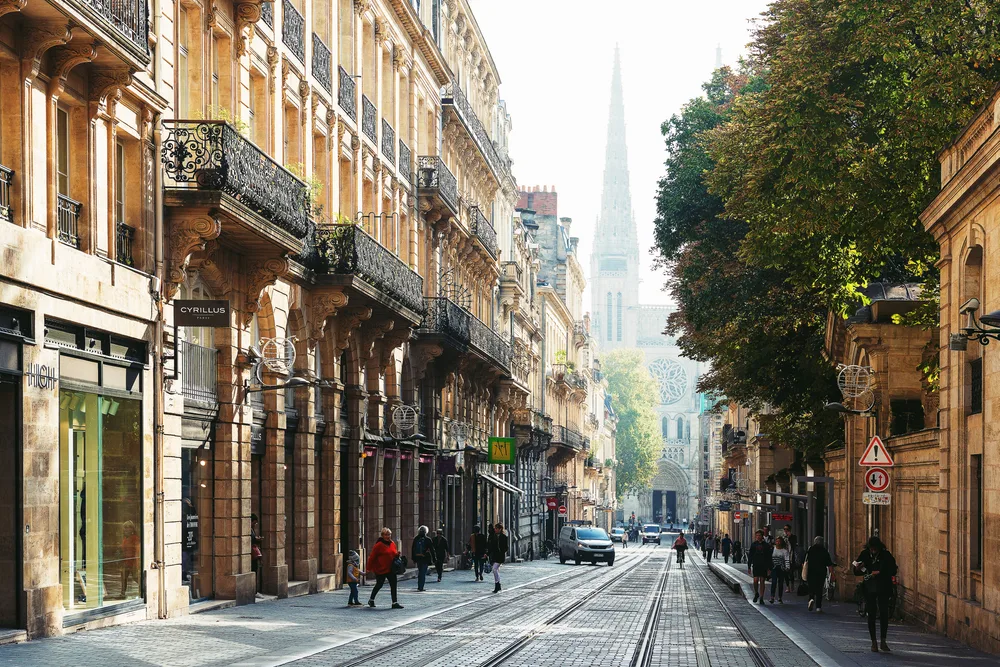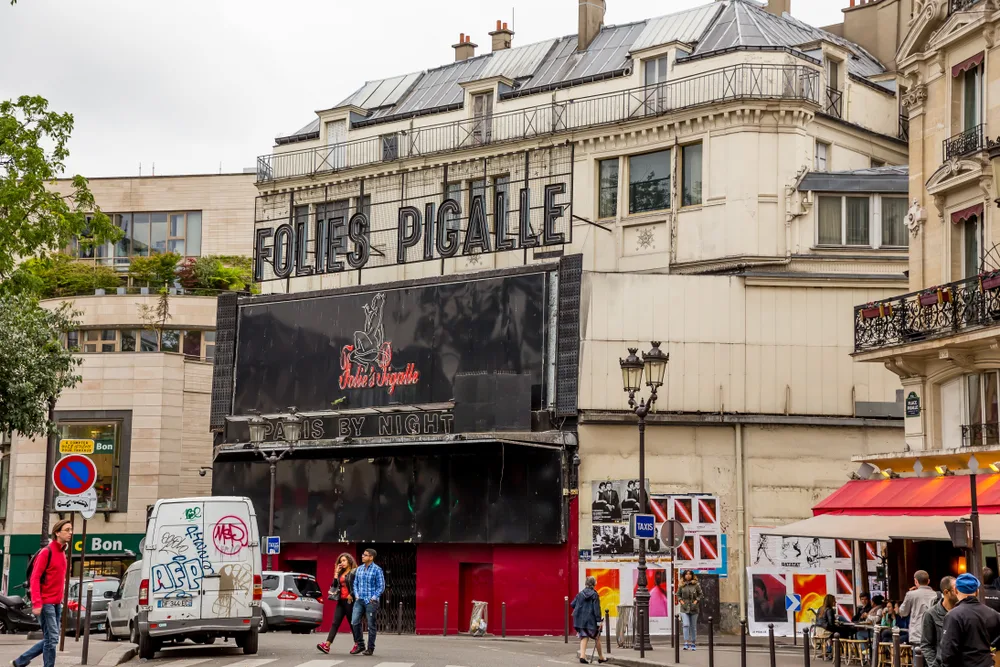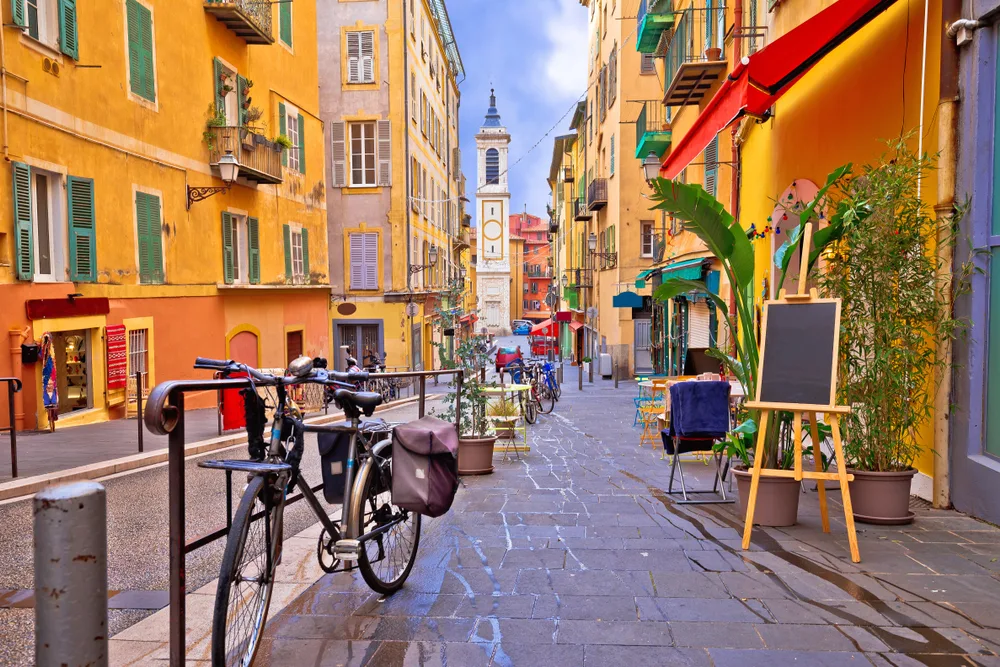It’s hard to think of why you wouldn’t want to visit France because there are so many reasons why you should. Paris, the capital, alone has so much to offer visitors, from centuries of history to a thriving, multicultural arts and culture scene in the present day.
Venture outside of the capital and you’ll find charms all over France. From the sparkling coast of the Mediterranean to the vineyards of Burgundy, France has beautiful nature and even more beautiful architecture.
And we haven’t even started talking about gastronomy and wine culture. But while this storied country is rich in culture, history, and (most importantly) food, is France safe to visit? Here’s our take.
Is France Safe to Visit in 2024?

Bordeaux, France. October 29, 2019. Morning street of the ancient city with tram tracks, hurrying pedestrians and a view of the beautiful cathedral in the fog/Mikalai Kachanovich/Shutterstock
Yes, France is a fairly safe destination for tourists. While some governments advise their citizens to exercise caution due to a slightly elevated risk of civil unrest and terrorist attacks, the many people who visit France each year usually pass by unscathed.
At worst, you might experience some petty theft or street harassment. The best testament to France’s safety is probably the visitor numbers. According to the French government’s own figures, 90 million international tourists visited France in 2019.
Although the numbers dipped in subsequent years, that was due to the COVID-19 pandemic impacting global tourism as a whole, not an issue with France itself.
If this many people visit France each year, they must be sure they will be safe. Some foreign governments do advise their citizens to exercise caution when visiting France.
For example, the United States has France under a Level 2: Exercise Increased Caution advisory due to terrorism and civil unrest. These warnings are echoed by other governments such as Australia, Canada, and the United Kingdom.
Many governments increased their alert levels for France as of February 2023. Ongoing nationwide strikes against pension reforms paralyze public transportation and block the streets.
While many foreign governments warn against civil unrest, the worst you’ll see if you get caught in a strike is probably some property damage or flares. It’s still better to avoid protests so you don’t get caught between protesters and the police.
Another common factor affecting the level of threat advisory is terrorism. France has been rocked by several high-profile terrorist attacks in the past, many resulting in fatalities.
Terrorist groups are open about the fact that they target France. The likelihood of a terrorist attack happening during your visit to France is low, and you could be a victim of one anywhere, even at home.
That said, it’s still good to keep the risk in mind. One problem that is not travel advisory-worthy but the most common headache for tourists in France is petty crime which happens often around tourist sites.
Pickpockets, bag snatchers, and scammers operate primarily in Paris, but also in other French cities. They are most common around popular tourist destinations and on public transportation.
Female travelers in France also describe a heightened level of sexual harassment, although this harassment is usually low-level such as catcalling. It’s still enough to make someone uncomfortable and feel unsafe.
To recap, the primary dangers when you visit France are:
- Terrorist attacks
- Protests turning violent
- Pickpockets
- Scammers
- Street harassment
- Natural disasters such as floods
Crime in France

Catarina Belova/Shutterstock
The primary concern for most visitors to France is if they will be a victim of a crime or not. The crime statistics for France are very encouraging and the country might even be safer than your hometown.
The violent crime rate for France, even when including terrorism attacks, is very low. As of 2019, the incidence rate was 1.35 homicides per 100,000 people.
Most homicides are concentrated in unsafe areas and targeted, so tourists are unlikely to be victims of a homicide. Other violent crime rates are low for France as well.
For example, according to World Population Review, the rape rate in France is 16.19 incidents per 100,000 people. The most common crime in France is theft. Burglaries are common, especially in bigger cities such as Paris and Marseille.
French police recorded that the burglary rate, at least as of 2018, was 1.8%. Most burglars target the primary homes of wealthy locals, but there have been situations with hotel or vacation home break-ins.
Other common forms of theft are vehicle theft or vehicle break-ins. The most common form of theft is petty theft. This comes in many different forms including pickpocketing, bag snatching, and scamming.
Pickpockets congregate around popular tourist destinations as well as on public transportation where the crowded conditions make it easier to operate. They are often children.
These crimes are rarely violent, they just wound your pride and take away some of your possessions. The crime rate in France is nothing to worry about. Most violent crimes never affect tourists, besides terrorist attacks that are by definition random.
Petty Theft
The most common crime tourists encounter in France is petty theft in the form of pickpocketing, bag snatching, and scams. Incidents are highest in Paris, which is France’s biggest city and one of its most popular tourist destinations.
They also occur in other cities, so you should be reasonably alert wherever you go. Paris is a hotspot for pickpockets not just in France, but also in terms of global tourist destinations. In 2019, 7,485 incidents of theft happened on the metro alone.
There are certain lines of public transit and stations that are notorious for pickpocketing, such as the Chatelet-Les Halles station, Metro Line 1, and RER link between Charles De Gaulle airport and the center of the city.
These are the lines that are the most crowded and attract the most tourists, making it a perfect crime of opportunity for pickpockets.
Pickpockets and bag snatchers also operate in Paris’s department stores such as Galeries Lafayette and will snatch phones and wallets from countertops. Other hotspots include popular tourist destinations such as the Eiffel Tower elevators, Louvre escalators, and Sacre-Coeur Basilica.
Paris isn’t the only city in France where you can get robbed, other big cities such as Marseille and Lyon have pickpockets, but it is the city with the biggest problem.
Obviously, the solution isn’t to avoid places where theft occurs as those are the attractions you want to see the most. What you can do is remain alert about your surroundings.
Don’t let your awe of the sights allow you to leave your valuables unattended or to put your phone in an open tote or front pocket of your backpack. Another form of theft that is common throughout France is vehicle break-ins.
This is particularly common in the south around Marseille. When visiting a tourist destination, even if you’re just stopping for five minutes to admire the view, don’t leave your wallet and ID on the dashboard.
A thief could break your window and take your things. Finally, scams targeting tourists are common in crowded areas.
In Paris, there is the bracelet scam, when scammers put bracelets on tourists then demand payment. Other forms of scams are people asking you to sign petitions or asking if you dropped a ring, which is to distract you while a partner robs you.
Terrorism
Terrorism is the main reason why many countries have travel advisories in place for France. The UK government warns its citizens to be vigilant since Islamist terrorist groups make it clear that they consider France a major target.
There are a few reasons why, from groups that claim France’s colonial history in the Muslim world as rationale to marginalization of local youth that leads to radicalization.
There have been a number of high-profile terrorist incidents in France recently, including a teacher’s beheading near Paris in 2020, a lorry attack in Nice that killed 86 people in 2016, and the infamous Islamic State attacks on Paris in 2015, including the attack on the concert hall Le Bataclan.
Not all terrorist attacks come from jihadist groups and French police foil a number of plots from far-right actors and organized crime groups annually.
France is certainly disproportionately targeted for terrorist attacks compared to other Western European governments. However, the probability that one will occur while you are in France is still very low.
While France may be the most targeted in Western Europe, the incidence of terrorism is still much, much lower than in other parts of the world.
The French government is taking measures to reduce terrorism attacks. After the 2015 attacks, they increased security presence, especially around popular tourist sites in Paris.
The government also has an alert system in place nationwide that communicates information about disasters, including terrorist attacks, through mobile phones. You can take a few steps to minimize your risk.
Monitor French news and make sure you read any alerts you get about possible terrorist attacks. When you’re in crowded areas, keep an eye out for possible exit routes. Other than that, you shouldn’t let the fear of terrorism affect your vacation.
Avoiding Bad Areas

Paris, France – July 21,2015 – Pigalle square in Paris/Maziarz/Shutterstock
Big cities everywhere, even in France, have sketchier parts. In France, most poor people live in banlieues, or suburbs at the outskirts of the city. These segregated neighborhoods have higher crime rates than the city center and you should avoid getting caught in them at night.
In Paris, there are a few parts that are sketchier than others. Pigalle, where the famous Moulin Rouge is located, is a hot spot for nightlife — and ladies of the night.
Sketchier neighborhoods include the northern districts of the 13th, 14th, 15th, and 16th arrondissements which have higher crime rates.
It gets seedy with prostitution, theft, and scams, especially after dark. Don’t walk around Bois de Boulogne after dark. Other seedy neighborhoods include Saint-Denis, Les Halles, and the area around Gare du Nord.
Marseille is France’s second-largest city and has a reputation for being seedy and crime-ridden. It’s a beautiful place to go and you’ll have a wonderful time if you know which areas to avoid. In terms of regions of France, there are no areas that are so dangerous tourists shouldn’t go there.
The island of Corsica has more organized crime than the mainland and occasionally separatists have demonstrations, but they usually don’t affect tourists.
Things to Consider
Here are some things to keep in mind while visiting France:
- Sexual harassment is fairly common in France, so female travelers might not feel comfortable walking alone at night.
- Never leave your luggage unattended or your cars unlocked, as you don’t want to present criminals with the perfect opportunity.
- Natural disasters are rare in France, but it still pays to read up on weather conditions if you are going hiking. Also, keep in mind that the ocean around Bordeaux has a lot of riptides if you go swimming.
- Protests in France are common, and usually they are not dangerous. However, things usually escalate after a police intervention so it’s best to avoid getting involved and leaving the area as soon as possible.
Frequently Asked Questions

xbrchx/Shutterstock
Here are some other things fellow travelers to France wanted to know:
Is Paris currently safe for tourists?
Yes, Paris is currently safe for tourists. Just keep basic safety precautions in mind such as holding your valuables in a safe place, the same as you would for visiting any city.
Is France safe for females?
France is a safe country for female travelers. However, women in France do experience street harassment and it is recommended that you avoid some areas at night if you are traveling alone.
Is it safe to be a tourist in France?
Yes, it is safe to be a tourist in France. As long as you don’t act obviously foreign and make yourself a target for pickpockets and scammers, you will have a great time.
Is France safe at night?
The answer depends on where you are. In all big cities in France, there are parts that are sketchier to go through at night, and taking public transportation solo isn’t recommended, but sticking to the bigger streets with lots of nightlife is safe as there are plenty of other people around.
What should I avoid in Paris?
In Paris, avoid interacting with the people offering bracelets as those are a scam. Always keep your ticket on you when entering the metro as you need it to leave (and to avoid the ire of metro inspectors). Avoid being careless with your belongings as thieves are likely to punish inattention.
So, Is France Safe to Visit in 2024?
Despite warnings about the potential for terrorist violence, France is very safe to visit as the likelihood you will be a victim is very low. Just keep a close eye on your belongings and you should be fine. So what are you waiting for — book your trip today!



